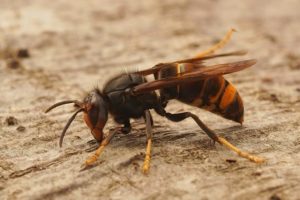Yellow-Legged Hornet : Threat To Pollinators

The first live specimen of a yellow-legged hornet, which “poses a threat to honeybees and other pollinators,” was recently detected in the wild in the United States.
- The Asian hornet,also known as the yellow-legged hornet or Asian predatory wasp, is a species of hornet indigenous to Southeast Asia.
- Scientific Name: Vespa velutina
- It is a predatory insect that commonly feeds on other social bees and wasps, including honey bees.
- This species has become invasive in several parts of the world, where it poses a threat to local ecosystems and bee populations.
- It is distinct from the infamous Asian Giant Hornet (Vespa mandarinia), often referred to as the “murder hornet,” which is a different and larger species found in parts of Asia, including Japan.
- While both species are predators of bees, the Yellow-Legged Hornet has become a particular concern in parts of Europe due to its invasive nature and impact on local ecosystems.
- It is relatively large, with adults typically measuring between 2 to 3 centimetres (0.8 to 1.2 inches) in length.
- It has a dark brown or black body with a distinctive bright yellow or orange band on its fourth abdominal segment.
- It has yellow legs, which is a key identifying feature.
- It is a very aggressive species and its sting is very painful.
- They are carnivorous and primarily feed on other insects, especially bees and wasps.
- They are known to be skilled hunters of honeybees.




